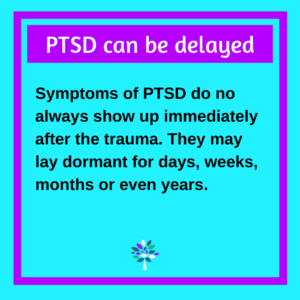PTSD Education

PTSD and problems related to a trauma do not always appear immediately. This does not make them any less valid, but it can be difficult for others to understand.
Situations in which this might happen: if a child is molested symptoms may not show up until they reach puberty and sexuality becomes a developmental issue. Then assumptions about themselves and their bodies that developed due to the trauma start to show up. The problems were set in motion by the abuse, but did not get triggered until sex and dating became an issue for that person.
Other times it may be due to having kids who are now approaching the age at which a person experienced a trauma, lost a parent, etc. This may trigger those assumptions about the world being an unsafe or scary place for kids. Again, this is rooted in the trauma but does not come up until later. Or it may be that the person has reached the age at which their own parent died and that death was traumatic, this too can trigger dormant symptoms.
There are many ways that trauma can impact in the short and the long term. Often getting into therapy right after the trauma can either prevent or mitigate any impact down the road. But sometimes different developmental stages or life events can unexpectedly bring up unresolved portions, or maybe they put past experiences into a new perspective. Whatever the case, these struggles and symptoms are still valid. And they can be dealt with in therapy.










